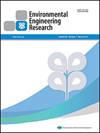Succession of fungal communities and fungal-bacterial interactions in biofilm samples within a multistage bio-contact oxidation reactor during the treatment of low-COD and high-salinity produced water
IF 3
4区 环境科学与生态学
Q3 ENGINEERING, ENVIRONMENTAL
引用次数: 1
多级生物接触氧化反应器处理低cod高盐度采出水过程中生物膜样品中真菌群落演替及真菌-细菌相互作用
本文章由计算机程序翻译,如有差异,请以英文原文为准。
求助全文
约1分钟内获得全文
求助全文
来源期刊

Environmental Engineering Research
Environmental Science-Environmental Engineering
CiteScore
7.50
自引率
5.70%
发文量
80
期刊介绍:
The Environmental Engineering Research (EER) is published quarterly by the Korean Society of Environmental Engineers (KSEE). The EER covers a broad spectrum of the science and technology of air, soil, and water management while emphasizing scientific and engineering solutions to environmental issues encountered in industrialization and urbanization. Particularly, interdisciplinary topics and multi-regional/global impacts (including eco-system and human health) of environmental pollution as well as scientific and engineering aspects of novel technologies are considered favorably. The scope of the Journal includes the following areas, but is not limited to:
1. Atmospheric Environment & Climate Change: Global and local climate change, greenhouse gas control, and air quality modeling.
2. Renewable Energy & Waste Management: Energy recovery from waste, incineration, landfill, and green energy.
3. Environmental Biotechnology & Ecology: Nano-biosensor, environmental genomics, bioenergy, and environmental eco-engineering.
4. Physical & Chemical Technology: Membrane technology and advanced oxidation.
5. Environmental System Engineering: Seawater desalination, ICA (instrument, control, and automation), and water reuse.
6. Environmental Health & Toxicology: Micropollutants, hazardous materials, ecotoxicity, and environmental risk assessment.
 求助内容:
求助内容: 应助结果提醒方式:
应助结果提醒方式:


